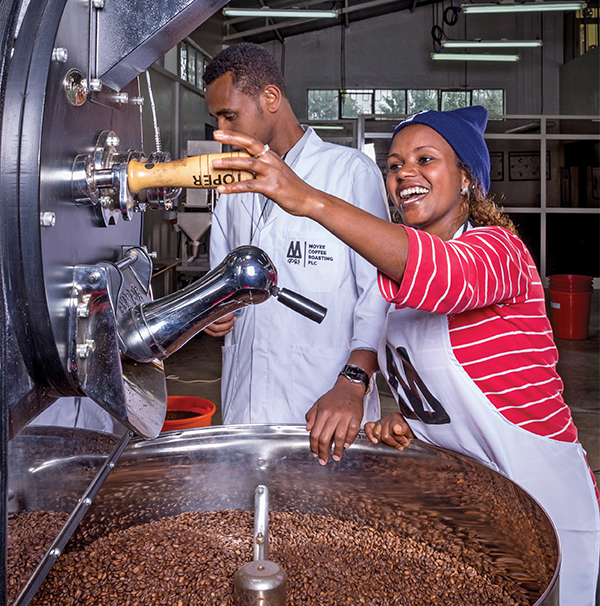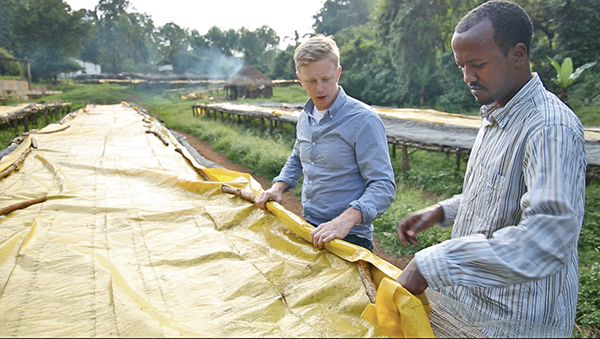
Pictured: Two coffee roasters in Ethiopia.
Photo by Mulugeta Ayene.
Fairchain and Fairtrade are two different initiatives to give third world countries a fair price for their produce. Fairtrade Ireland first came to these shores in 2003 and since then has seen 51 towns across Ireland using Fairtrade channels.
The idea behind the concept is to give the farmers in developing countries a fair price for their produce.The initiative was originally set up by a faith-based NGO from the Netherlands. It was then replicated in other countries and then all consolidated under the umbrella organization called the Fairtrade Labelling Organizations (FLO).
If the product has conformed to the standards set out by the FLO, in terms of environmentally friendly practices and working conditions, the produce will receive the Fairtrade label.
In order for a fair price to be given to the farmers and workers, a minimum price is set per weight of produce for the farmers and if the market price goes up so does the amount given to farmers and with that a small percentage is also given back to help schools and hospitals in the area.
The Fairtrade coffee business has made amazing strides in the last decade, rising above 125,000 tonnes per annum since its 10,000 tonnes sold at the start of the century.
However, a study in 2010 of Nicaragua’s coffee farmers showed that the organic farmers and the conventional ones (those who use synthetic pesticides and herbicides) were not as poor as the Fairtrade farmers who were struggling to make ends meet by using organic means, which the market demands.
Scholars in the field suggest using institutions that directly transfer the benefits to producers in developing countries rather than using market-based mechanisms like fair-trade and a new initiative called Fairchain is exactly that type of institution.
Fairchain has similar aims to Fairtrade in terms of giving farmers a fair price but, according to local Entrepreneur Killian Stokes who is responsible for bringing the first Fairchain coffee, Moyee, to Ireland, “Moyee bean to bag is five times the impact of Fairtrade, it brings five times more jobs, so for example in our factory in Addis Abada we have a team of 48 with between 200 to 300 farmers and during harvest season we create 300 jobs. We could transform the €800m it makes into €2.5bn in a couple of years like the way Vietnam did it over a ten-year period, and they do it with a mediocre bean, whereas we use Arabica [which is] classified as a speciality bean.”
Stokes’s family moved to St. John’s Road in Sandymount when he was nine and he went to school in Colaiste Eoin. Although the house is now demolished, Stokes says locals would remember it when it stood as the ‘house with the two dogs’.
Stokes originally began his career in the technology sector and won a Vodafone World of Difference Award for his idea that allowed people to donate their loyalty points and air miles to charities, but he said the timing was all wrong due to the recession and it was difficult to get the funding for it to go live.
He has worked in corporate fundraising for Barnardo’s and Concern but it was his trips to Africa that changed his way of thinking. “I’m passionate about ending poverty but not sure about NGO charities. I believe when you start giving charity to adults it’s a different story.”
He recalls a time, whilst working with Self Help Africa, and standing in a field in Ethiopia with three women who had taken out loans to start businesses: “These women were intimidating, they had such great confidence, they didn’t want anything from me, over there they are treated like secondary citizens but now they could say with pride that they were respected in their communities, especially by their husbands.”
Stokes is passionate about putting the tools in these people’s hands rather than charity. He attempted to set up his own Fairchain coffee import business called Beantribe, but said he was importing such small amounts and getting hit with too much freight charge that it wasn’t working for him.

Pictured: Killian Stokes meeting coffee producers in Ethiopia.
Photo by Deirdre Treacy.
Stokes protests that the amount of money leaving the country of origin is too much: “On a trip to Mount Elgon (on the border of Uganda and Kenya), I came across a factory sponsored by Irish Aid, where it was selling a kilo of coffee beans for 30 cents whereas we buy it here for thirty euro a kilo. Less than three euro stays in the country.
All the jobs and profit leave the coffee belt. Fairtrade has been around for 25 years, it doesn’t change much, it’s good, but it doesn’t go far enough.”

Pictured: Killian Stokes and Shane Reilly at RDS Bite Festival.
Photo by Jordan Arotzarena.
If you’re looking for more information or you would like to purchase their products please visit: moyeecoffee.ie
By Paul Carton



